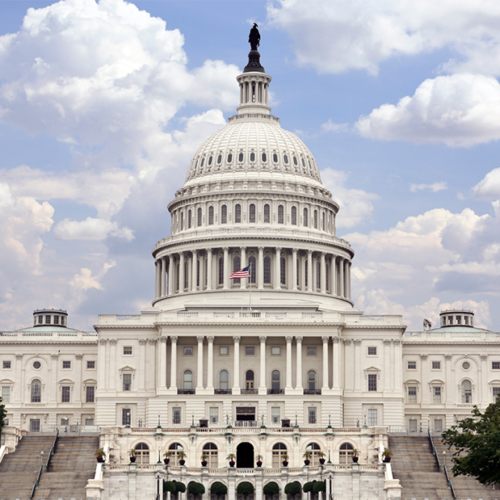
Congress Expresses Bipartisan Support for Key Justice Programs
Over the past several weeks, Congressional leaders have demonstrated strong bipartisan support for sustaining three key criminal justice programs in FY2021—the Mentally Ill Offender Treatment and Crime Reduction Act (MIOTCRA), the Justice Reinvestment Initiative (JRI), and the Second Chance Act (SCA). Together, these programs have helped states and local communities reduce the cycle of arrest and incarceration for people with mental health needs, develop data-driven policies designed to reduce corrections spending, and strengthen reentry for people returning to their communities from prison and jail.
Megan Quattlebaum, director of The Council of State Governments (CSG) Justice Center sees this continued support as vital to sustaining and deepening trends toward increased public safety and reduced recidivism. “On behalf of the CSG Justice Center, we want to thank the members of Congress who signed these bipartisan letters. We’ve seen firsthand how critical MIOTCRA, JRI, and SCA are to people working in the criminal justice system and those most impacted by it. And we look forward to working with Congress to ensure that these programs continue to receive support during the FY2021 appropriations cycle,” she said.
Congressional support for the three criminal justice programs includes:
- U.S. Reps. Doug Collins (R-GA), Bobby Scott (D-VA), Tom Emmer (R-MN), and Norma Torres (D-CA); and U.S. Senators John Cornyn (R-TX) and Amy Klobuchar (D-MN) gathered 76 signatures in the House and 33 in the Senate to support continued funding for MIOTCRA. The Justice and Mental Health Collaboration Program—authorized under MIOTCRA and reauthorized under the 21stCentury Cures Act—ensures criminal justice and mental health systems throughout the country have the funds they need to serve some of the nation’s most vulnerable people. The law funds mental health courts, mental health and substance use disorder treatment for people in the criminal justice system, community reentry services, and local law enforcement training to help officers identify and improve their responses to people who have mental health needs. To date, grants awarded under this program have funded more than 200 mental health courts and other court-based initiatives, supported over 125 law enforcement agencies, and provided a total of 531 grants to 49 states, the District of Columbia, Guam, and American Samoa.
- U.S. Reps. Adam Schiff (D-CA), Steve Chabot (R-OH), and Carol Miller (R-WV); and U.S. Senators Thom Tillis (R-NC) and Sheldon Whitehouse (D-RI) gathered 58 signatures in the House and 27 in the Senate to support continued funding for JRI, a data-driven approach that helps states reduce corrections and related criminal justice spending and reinvest their savings in strategies that improve public safety. In recent years, more than 35 states have deployed a Justice Reinvestment approach to develop policies to slow overall prison growth, and for some states, reduce the total prison population. States have reported cumulative savings and averted more than $1.1 billion in costs while also investing millions in effective supervision and treatment programs to make communities safer. These have included efforts to improve community supervision, expand community-based treatment and services, create grants to support local law enforcement, enhance victims’ services, and more.
- U.S. Reps. Bill Johnson (R-OH), Danny Davis (D-IL), and Mark Walker (R-NC); and U.S. Senators Cory Booker (D-NJ) and Rob Portman (R-OH) gathered 86 signatures in the House and 30 in the Senate to support continued funding for the SCA, which was reauthorized as part of the landmark First Step Act. Since its enactment, recipients of SCA grants have worked to improve outcomes for people returning to their communities from prisons and jails, providing vital services—including employment training and assistance, substance use disorder treatment, education, housing, family programming, mentoring, and victims support. There have been more than 900 grants awarded in 49 states, the District of Columbia, and U.S. territories, allowing jurisdictions to develop, improve, and expand reentry programs and policies. SCA grantees have served more than 164,000 participants since 2009.
Image by Francine Sreca from Pixabay.
When returning to their communities from criminal justice settings, people with behavioral health needs face barriers in accessing…
Read MoreNew Hampshire Department of Corrections Commissioner Helen Hanks presents at the Medicaid and Corrections Policy Academy in-person meeting.
Read MoreArkansas policymakers have long expressed concerns about the state’s high recidivism rate. Over the past 10 years, an…
Read More Assigned to the Cloud Crew: The National Incarceration Association’s Hybrid Case Management for People with Behavioral Health Needs
Assigned to the Cloud Crew: The National Incarceration Association’s Hybrid Case Management for People with Behavioral Health Needs
When returning to their communities from criminal justice settings, people with behavioral…
Read More Meet the Medicaid and Corrections Policy Academy Mentor States
Meet the Medicaid and Corrections Policy Academy Mentor States
New Hampshire Department of Corrections Commissioner Helen Hanks presents at the Medicaid…
Read More Explainer: Key Findings and Options from Arkansas’s Justice Reinvestment Initiative
Explainer: Key Findings and Options from Arkansas’s Justice Reinvestment Initiative
Arkansas policymakers have long expressed concerns about the state’s high recidivism rate.…
Read More Six States Commit to Improving Statewide Strategies to Address Youth Crime, Violence and Behavioral Health
Six States Commit to Improving Statewide Strategies to Address Youth Crime, Violence and Behavioral Health
The Council of State Governments (CSG) Justice Center has launched the Collaborating…
Read More Explainer: How a New Law in Arkansas Tackles Crime, Recidivism, and Community Supervision Challenges
Explainer: How a New Law in Arkansas Tackles Crime, Recidivism, and Community Supervision Challenges
In April 2025, Arkansas Governor Sarah Huckabee Sanders signed a package of…
Read More Bipartisan Group of 88 Lawmakers Push for Continued Funding for Reentry and Recidivism Programs
Bipartisan Group of 88 Lawmakers Push for Continued Funding for Reentry and Recidivism Programs
A bipartisan group of 88 lawmakers, led by Representatives Carol Miller (R-WV)…
Read More









